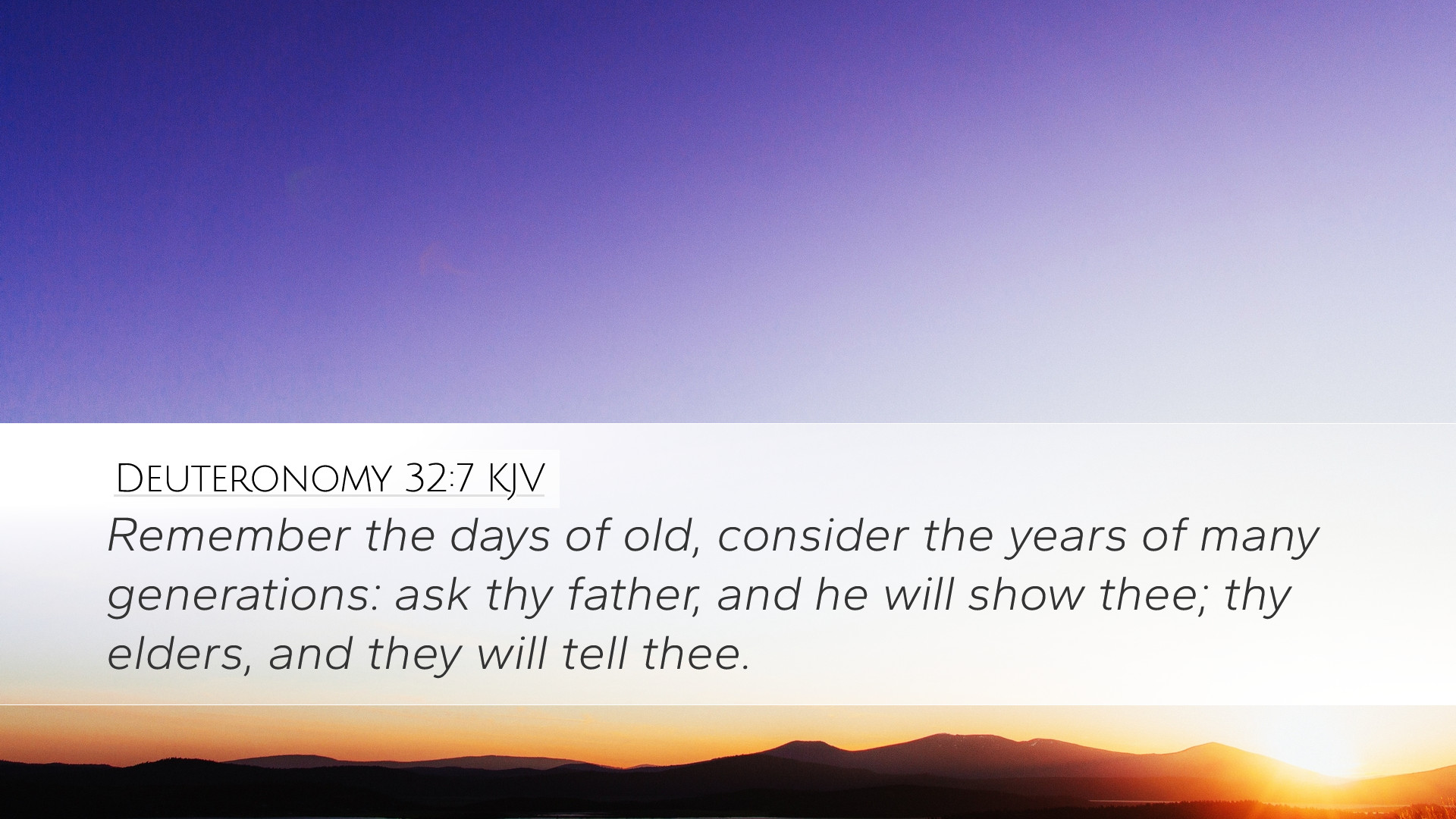Commentary on Deuteronomy 32:7
Verse Reference: Deuteronomy 32:7 (KJV): "Remember the days of old, consider the years of many generations: ask thy father, and he will show thee; thy elders, and they will tell thee."
Overview
This verse occupies a significant place within the themes of remembrance and instruction in the Pentateuch. Here, Moses urges the people of Israel to recall their history, to learn from the past, and to share the wisdom of their forebears. The verse reflects the core idea that history is essential for understanding one's identity and purpose, especially in a covenantal community.
The Importance of Memory
Matthew Henry's Commentary: Henry emphasizes the importance of memory and reflection upon past experiences as a conduit for understanding God's works. He highlights that memory serves both as a testament to God's faithfulness and a manual for future conduct. The past is not merely to be recalled but actively considered; an engagement that fosters deeper appreciation of divine guidance throughout generations.
Albert Barnes' Notes: Barnes interprets this remembrance as a call to the nation to acknowledge its roots. He asserts that by looking back at the deliverances and the providence experienced in their history, they can gain insight into their current relationship with God. The act of remembering serves as powerful encouragement and reiterates the necessity of maintaining a connection with their lineage.
The Role of Elders
Adam Clarke's Commentary: Clarke points out that the instruction to "ask thy father" and "thy elders" emphasizes the role of older generations in conveying wisdom. The elders possess experiential knowledge of God's workings which can provide guidance for younger generations. This multi-generational dialogue is crucial for preserving the faith and traditions of the community.
It is also essential for building a sense of responsibility among the younger generation to seek out their heritage and understand the significance of their covenantal relationship with God. Clarke urges readers to recognize the wealth of spiritual insight that lies in the stories shared by their predecessors.
Thematic Implications
This verse connects deeply to the broader themes of covenant identity, community, and the relational dynamics of faith. Each element reiterates that spiritual identity is shaped by both individual response and collective memory.
- Covenantal Memory: The verse underscores that remembering is integral to fulfilling God's covenant. It invites reflection on God's promises and historical acts.
- Inter-generational Wisdom: The dialogue between generations is an essential aspect of faith continuity. The elders are vital in instructing the young, securing the faith’s propagation.
- Personal Responsibility: The call to remember invokes a sense of responsibility within individuals to engage with their heritage actively and purposefully.
Practical Applications
For pastors, students, and theologians, this verse encourages practical applications such as:
- Encouraging Remembrance: Churches can institute traditions that foster remembrance of significant historical events in their community, motivating congregants to reflect positively on God's faithfulness.
- Facilitating Inter-generational Dialogues: Organizing discussions or forums where older members impart their experiences can strengthen communal bonds and strengthen faith.
- Teaching Historical Context: In educational settings, instilling the importance of biblical history helps students understand the foundation of their beliefs and practices.
Conclusion
In conclusion, Deuteronomy 32:7 calls for a profound engagement with memory, lessons of the past, and inter-generational exchanges. As believers reflect on their shared history and seek wisdom from their elders, they position themselves to not only understand their present but also to faithfully engage with their future in God's service. This verse reminds us that wisdom is a continuum passed from one generation to the next, essential for nurturing a vibrant faith community.


